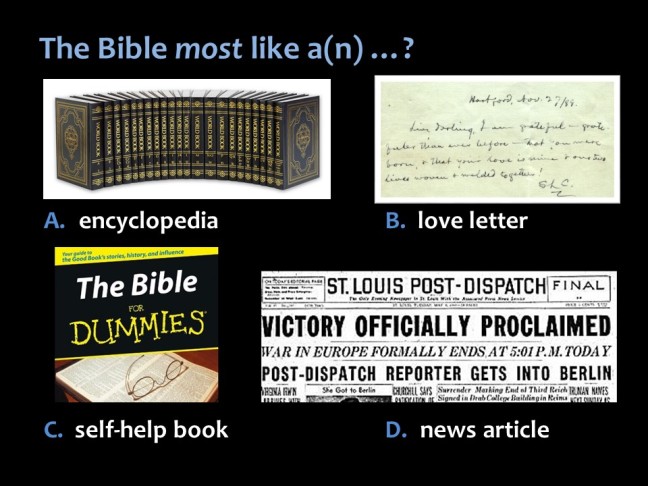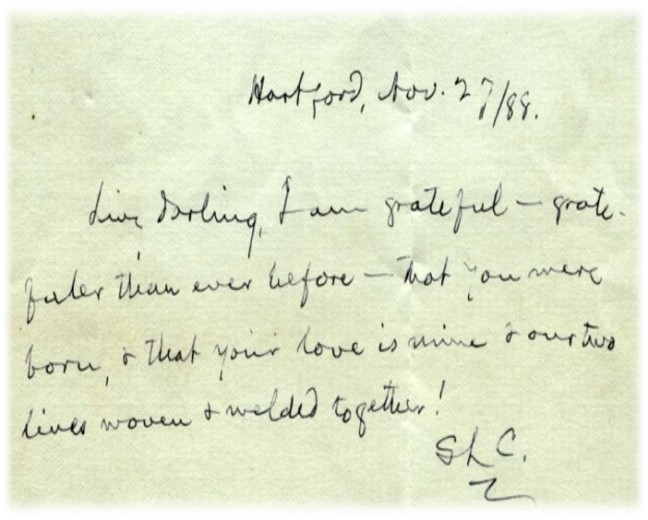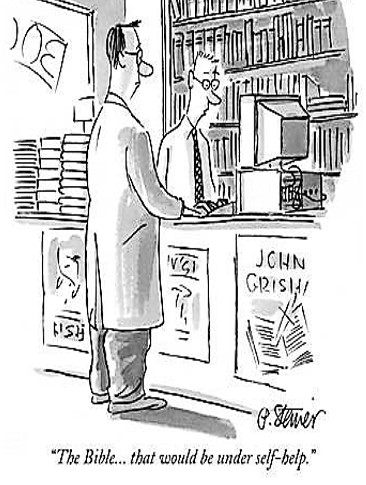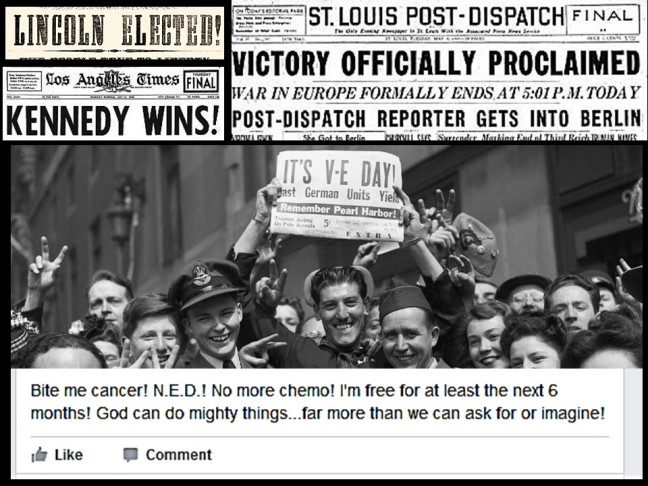
How would you compare the Bible to other writings? Which is it most like a(n) …
- A. Encyclopedia?
- B. Love Letter?
- C. Self Help Book?
- D. News Article?
Option A. When I was eight, my family got a World Book Encyclopedia set.
 I loved these books. I would spend hours looking up and reading about interesting topics like Blue Whales, Jet Engines, and Earthquakes. The Encyclopedia was created during the time of the Scientific Revolution, around 300 years ago. The goal of the encyclopedia was to record and organize all human knowledge. So if we compared the Bible to an encyclopedia, the Bible would be like a reference volume of information about God; a repository of divine truth—God’s nature and attributes, what God loves and what God hates.
I loved these books. I would spend hours looking up and reading about interesting topics like Blue Whales, Jet Engines, and Earthquakes. The Encyclopedia was created during the time of the Scientific Revolution, around 300 years ago. The goal of the encyclopedia was to record and organize all human knowledge. So if we compared the Bible to an encyclopedia, the Bible would be like a reference volume of information about God; a repository of divine truth—God’s nature and attributes, what God loves and what God hates.
Option B. This is photo of Samuel Clemens, his wife Olivia, and their three daughters.

You know Mr. Clemens by his pen name, Mark Twain. In November of 1888, after they’d been married 18 years, the famous writer penned a letter to his dear wife, Olivia:

What makes a love letter different from an encyclopedia is that it doesn’t focus on information about the outside world. A love letter expresses the emotions of the heart and the intentions of the will. A love letter uses words for building up a relationship of trust, respect and admiration between one person and another. So if we compared the Bible to a love letter, we’d be saying that the Bible does something similar. It’s not primarily about scientific and historical facts; it’s the expression of God’s affection and concern for us.
Option C. Americans love self-help books.

If the Bible is like a self-help book that God himself wrote, we’d be saying that the Bible is a resource to help us. It’s easy to poke fun at self-help books, but in their best sense, you could say that they have the motive of a love letter and the content of an encyclopedia; out of the author’s love for others, he applies the best of his knowledge to help people.

Is the Bible like that in any way? Or maybe it’s more like a love letter or an encyclopedia?
Option D. Whether you get your News from Facebook or the local paper, you know a Good News Article when you see it.

The candidate you were pulling for was elected. Your loved one’s pronounced “No Evidence of Disease” after a year of chemotherapy. The war is finally over.
A Good News Article and an encyclopedia article have similar content. They’re reports of real events. But if it’s truly good news for you, it’s different than an encyclopedia because you have some stake in these events: you’ve been praying, campaigning, suffering for this moment and now it’s here. But it may not have the same level of personal involvement of a love letter. And it may or may not be as transforming as a good Self-Help book.
So now it’s time to decide. We’ve got four options. They each say something well. But, with any comparison, they all fall short in some way. How could they not fall short? After all, we’re comparing God’s words with merely human writings. The writings of the Bible are verbally inspired (2 Timothy 3:16). They say just what God wanted to say to create, sustain, and mature our faith. We can’t say this about other writings. The Bible is truly God’s book. At the same time, the Bible is also a fully human book. We can make an analogy here with Jesus. We say that Jesus is both fully God and fully human. So also with the Bible. God used the human background, vocabulary and style of each Scriptural author to convey God’s truth. Because of this fully human character of the Bible, we can compare it to other human writings. So, of four, which is the best?
I did a poll with my congregation to vote on this question. Here were the results:

My congregation is part of the LCMS, a Church Body that is doctrinally conservative and highly values education. In the early days of the LCMS, when people started a new congregation, they would simultaneously start a school (for example, see the history of St Trinity Lutheran in South Saint Louis). Being more cerebral about the faith, we are drawn to the Encyclopedia understanding of the Bible.
More progressive church bodies would tend to see the Bible like a love letter. Some evangelical churches would be more drawn to the Self Help option. We all read the Bible, but often approach it in radically different ways.
Each of the four options says something true about the Bible. Here’s how they fall short. They all tend to see the Bible as a distant lake. But the Bible wants to pull us into the river.

What’s the difference between a lake and a river? Somewhere in Chicago there’s a bar. And in that bar there is a men’s room with a toilet. And above that toilet is a sign. It says, “Flush, St Louis needs the water.” The joke’s on us Saint Louisians because we’re downstream. So we retort, “Yeah, we need the water! So we can make beer and sell it to Chicago.”
With a lake, you can keep things separate.
With a river, we’re all connected.
Let’s say we think the Bible is a distant lake. We might be very interested in its water. We might want to make a pilgrimage with our pail and get some water every now-and-then so we can bring it back to our lives.
The water might be knowledge about God (like an encyclopedia), an expression of God’s affection (like a love letter), practical advice on how to be a better person (like a self-help book), or the Good News report that because Jesus died and rose again, our sins are forgiven.
Those are true qualities of the Bible’s water of life. But there is more, because the Bible is not a distant lake filled with religious truth. The Bible opens up the river in which we and all things exist. We are all caught up in its flow of events even if we don’t recognize it. I might imagine I have a little kingdom all to myself and my people; a place where we get to say what goes and decide what’s true. But the fact is, that little kingdom is just a tiny raft in God’s river, revealed in the Bible.
Switching metaphors, the Bible is the story of everything.
It’s a window into the only reality. It is not a part of some larger story. It is not something I can use or apply in the larger story of my life. If I want to live truthfully, I must fit my little life, my little church, my little country into the Bible’s larger story. Whether I recognize it or not, I am a real-life character in the Bible, just like Abraham and Sarah, Moses and Zipporah. God is the author of this story. In Jesus, the author himself has become the central character in this story. And now all events, all plans, all streams lead to Jesus.
And what do we find when the river brings us to Jesus? We get good information. Better than a reliable encyclopedia, the Bible gives us a trustworthy way to interpret the world. Not only is it the singular source and norm for Christian teaching, it also provides a framework for evaluating all other claims to truth, whether the truth is labeled religious, scientific, historical, or existential. By providing a worldview, the Bible doesn’t list every fact about the world. But it does help us focus on the right facts, and to not fret on the rest. Yet, the Bible is more than a worldview. Through it, we get to hear God’s unbreakable vow of love for us, plus the good news that He defeated sin, death, and the power of the devil. Finally, we get help. Not self-help, but God’s help for living as His children.
All that’s left is to jump in the river.

Wait, you mean that the Bible isn’t an encyclopedia..?
Great column!
LikeLike
Thanks!
LikeLike
Excellent article Mike. Thanks bud.
LikeLike
Keith, thanks for reading! I’m glad you liked it.
LikeLike